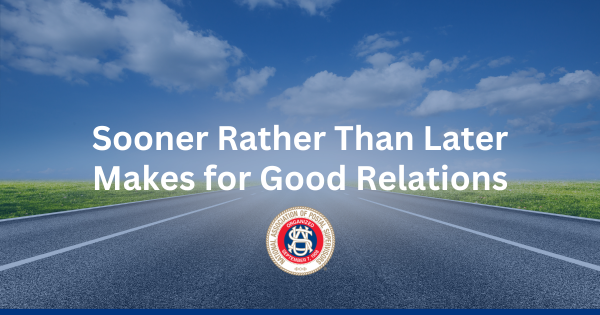Sooner Rather Than Later Makes for Good Relations
Sooner Rather Than Later Makes for Good Relations
By Ivan D. Butts
NAPS National President
Hello, NAPS brothers and sisters. As of the writing of this column, we are posting our first pay talks meeting with the USPS held on July 28 that resulted in an extension until Sept. 22. This meeting comes 969 days after NAPS’ request to enter pay talks with USPS Headquarters before the expiration of our previous pay agreement.
The USPS denied this and two later requests to begin pay talks with NAPS. There is nothing prohibiting NAPS and the USPS having a pay agreement done before the collective bargaining agreement with the union having the largest number of employees.
In 39 U.S. Code § 1004(e), it stipulates:
“The Postal Service shall, within 45 days of each date on which an agreement is reached on a colletive bargaining agreement between the Postal Service and the bargaining representative recognized under section 1203 of this title which represents the largest number of employees, make a proposal for any changes in pay policies and schedules and fringe benefit programs for which are to be in effect during the same period as covered by such agreement.”
So, what is the benefit to the USPS not waiting until the 45 days have expired to make its proposal to the supervisor’ organization? The main benefit is labor stability and proactive management of employee relations. This could build Issue and foster some tangible benefits for USPS leadership and all EAS employees for whom NAPS advocates.
Making a timely or early proposal shows the Postal Service values its supervisors and treats them as important contributors, not afterthoughts. It avoids the perception that supervisors are “second tier” compared to bargaining-unit employees.
Supervisors often are promoted from the bargaining unit; they compare their compensation packages. Waiting too long could lead to dissatisfaction or attrition if supervisors feel they are being neglected or unfairly compensated.
Also, early proposals allow more time for discussions and potential mediation if there is disagreement. If the USPS waits until day 45 and a dispute arises, there’s less time to resolve issues before the start of the new pay agreement.
Early engagement also allows the agency to shape the conversation and preempt potential public or political pressure regarding treatment of supervisory personnel. This can be particularly useful in environments like NAPS’ where pay compression (supervisors earning less in total salary than those they supervise) is a concern.
Earlier engagement could help avoid mandatory fact-finding. Under 39 U.S. Code § 1004(f)-(h), if an agreement is not reached with the supervisors’ organization, a fact-finding panel is convened. If the USPS delays and the process becomes rushed, it increases the likelihood of disputes going to a fact-finding panel, which adds cost and risk.
While the Postal Service has up to 45 days by law, choosing to act earlier demonstrates leadership, maintains positive employee relations and reduces operational and legal risks. It’s a smart labor-relations strategy—not just a courtesy.
In solidarity …
